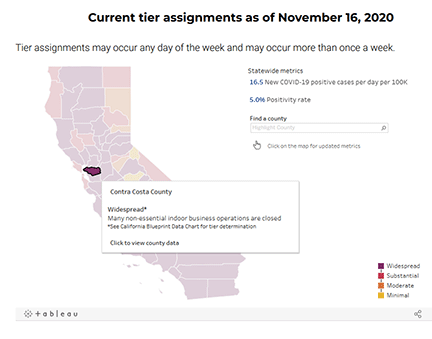With new COVID-19 cases and hospitalizations surging across California, the state today restored safety measures in Contra Costa and many other counties that are needed to protect the public and save lives during the pandemic.
The return to the purple tier of California’s Blueprint for a Safer Economy comes with some additional requirements for businesses and community activities not imposed in Contra Costa since summer. But the change also reflects an approaching danger that health experts see in recent COVID-19 data, in the U.S., California and Contra Costa County.
The adjusted average daily number of new COVID-19 cases in Contra Costa has doubled in recent weeks, rising from 4.3 per 100,000 population on Oct. 16 to 9.2 on Nov. 16.
The average daily percentage of COVID-19 tests that return positive in Contra Costa has also increased sharply, from 1.9% on Oct. 16 to 3.6% on Nov. 16.
Health officials are also closely monitoring the number of people hospitalized in Contra Costa because of COVID-19, as a large surge in patients could overwhelm the local healthcare system. There were 21 hospitalized COVID-19 patients in Contra Costa on Oct. 16, compared to 48 on Nov. 16.
To prevent unnecessary illness and death in our community, Contra Costa Health Services (CCHS) urges residents to take the safety requirements seriously and consider what they can do to reduce the risk of infection to themselves and their families – such as wearing face coverings whenever they leave home.
Growing evidence shows that simple cloth face coverings reduce the spread of COVID-19, providing some protection to the wearer and, more importantly, protecting people near a wearer who is infectious but does not yet know they are sick.
“The most simple, effective way to prevent the spread of COVID-19 is to wear a face covering whenever you leave home or are around people who do not live with you,” said Dr. Chris Farnitano, county health officer. “This may also be a time to consider a remote holiday gathering. We all want to see each other, but it is important to carefully consider the risks before meeting in person with our loved ones.”
Contra Costa, previously in the red tier, already enacted local health orders last week that added additional safety requirements beyond what the state had mandated, including a moratorium on indoor dining and operation of indoor gyms and fitness centers.
Contra Costa moved into the red tier just last week from the orange tier. The state today changed its guidelines to expedite movement of counties into more restrictive tiers in response to the growing public health crisis. More information is expected to be posted at the state’s web page.
Changes caused by the state’s action today will include:
- Social gatherings involving people from different households are permitted outdoors only, with a maximum of three households and 25 people, preferably for less than two hours.
- K-12 schools may not reopen for in-person instruction unless they have already begun to do so.
- Worship services and cultural ceremonies must now be held outdoors only.
- Higher education institutions must move indoor lectures and student gatherings outdoors only.
- Movie theaters may operate outdoors only.
- Museums and exhibit spaces may open outdoors only.
Visit covid19.ca.gov for more information about the state health guidelines, and state data regarding COVID-19.
Editors Note:
According to County data, here is a look at the hospitalizations over the past week
- 11/7 – 38
- 11/8 – 46
- 11/9 – 45
- 11/10 – 45
- 11/11 – 50
- 11/12 – 50
- 11/13 – 46
- 11/14 – 45
- 11/15 – 48
For Contra Costa data and COVID-19 health information, visit cchealth.org/coronavirus.


1 comment
It’s too late to change horses in the middle of this pandemic stream, but one of the long term lessons should be that emergency public health actions are ineffective and confusing when implemented county-by-county (for no other reason than that’s the way government bureaucracy is organized. They must be, at a minimum, regional actions covering multiple counties.
Think about it. We regulate water quality with REGIONAL water boards because water quality issues don’t stop at county lines. We regulate air quality with REGIONAL air quality districts for simple reasons. Well, pandemics don’t change at county lines either.
County health departments are fine for routine functions, but not for pandemics. State legislature, are you listening?
Comments are closed.